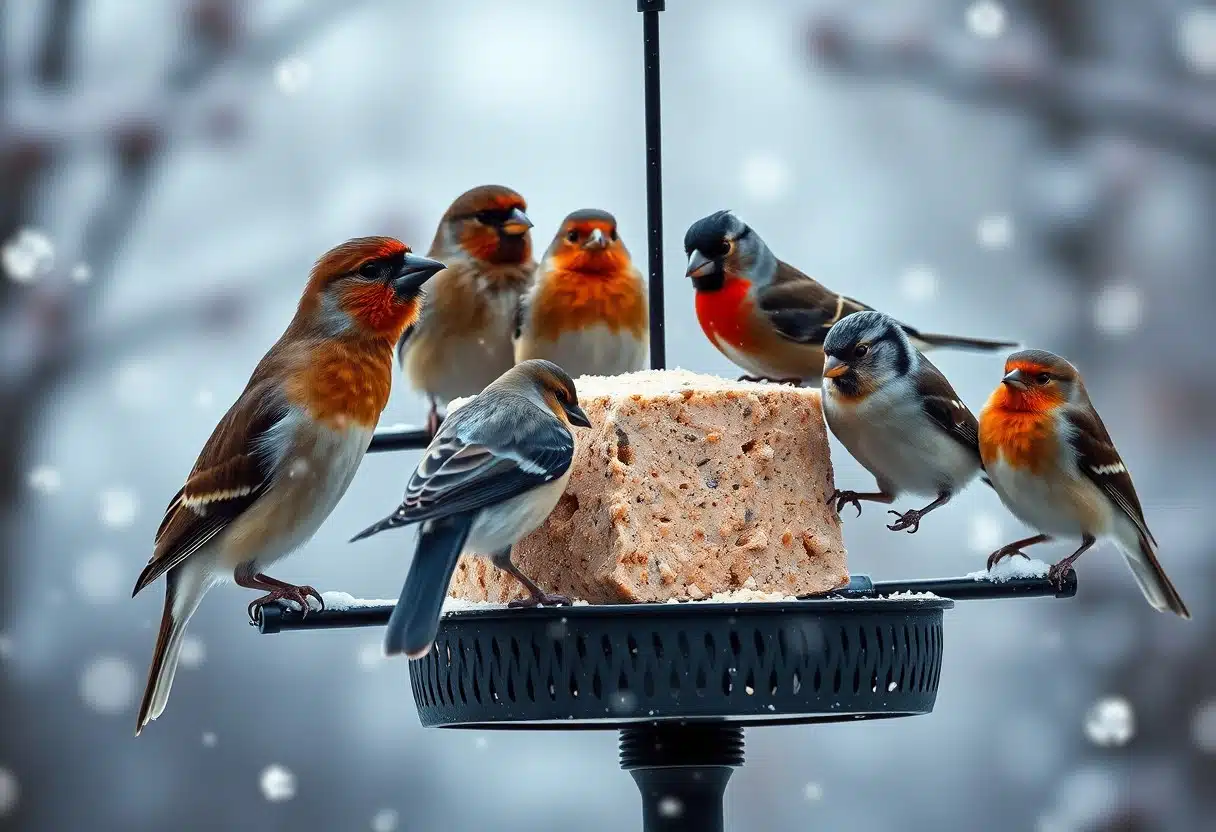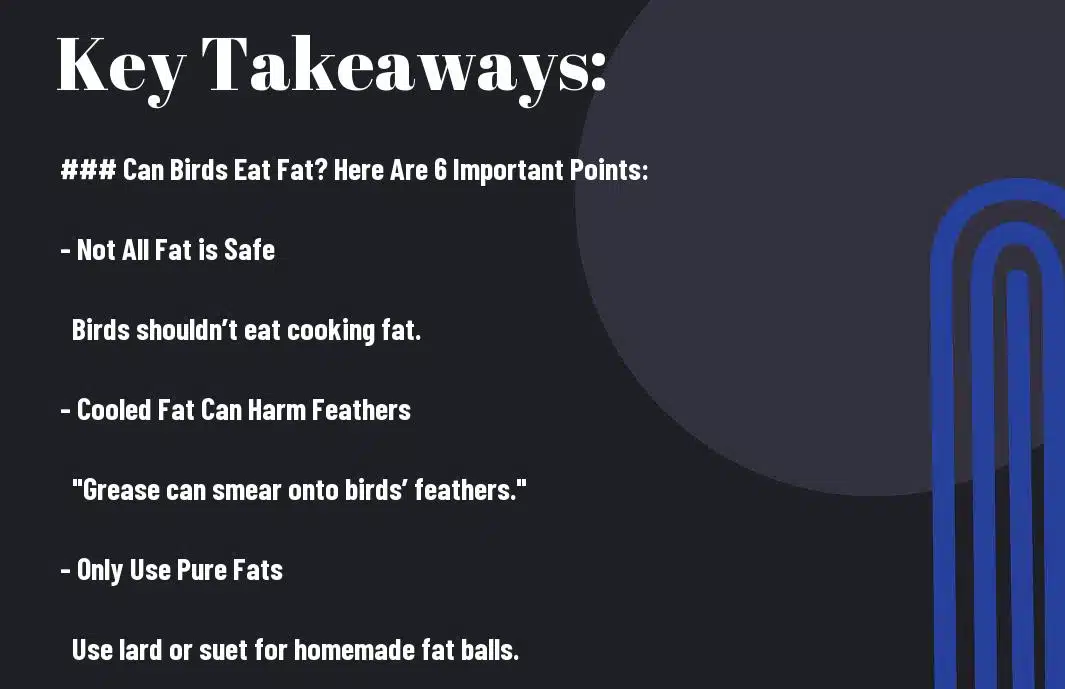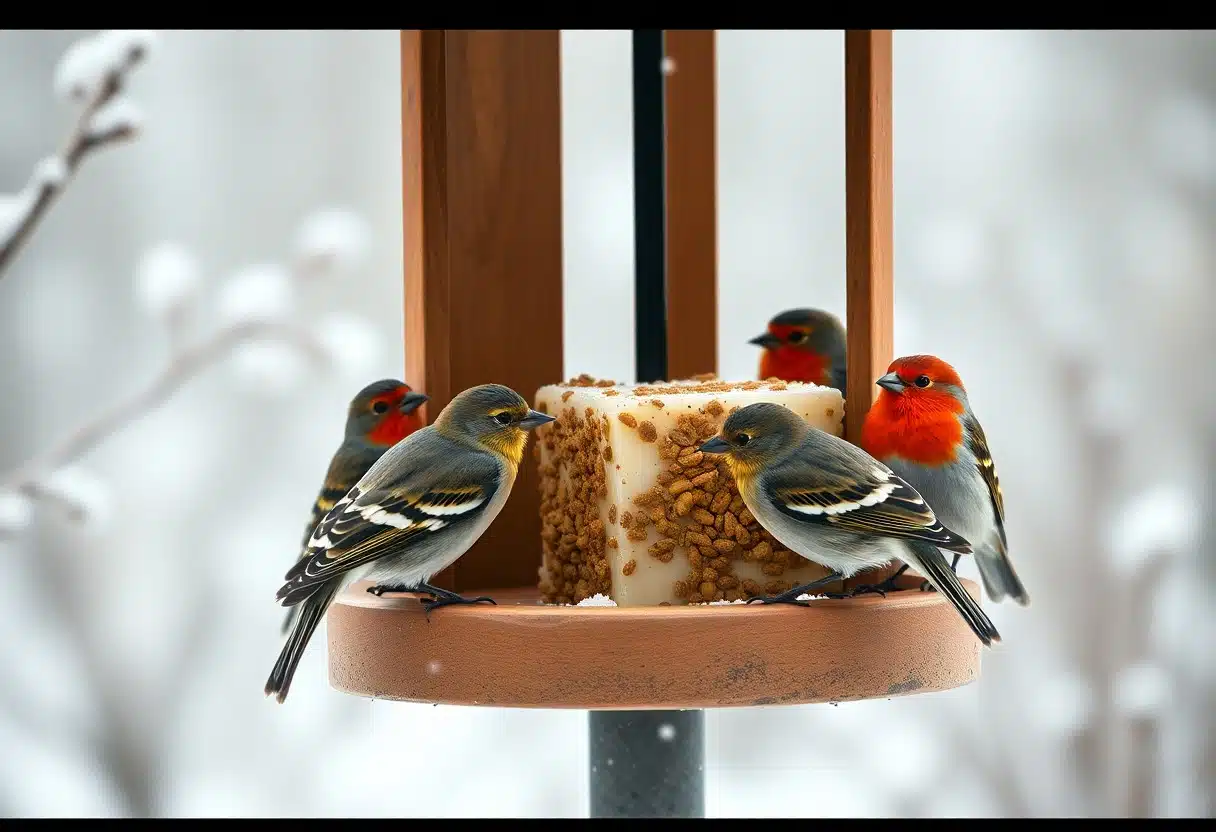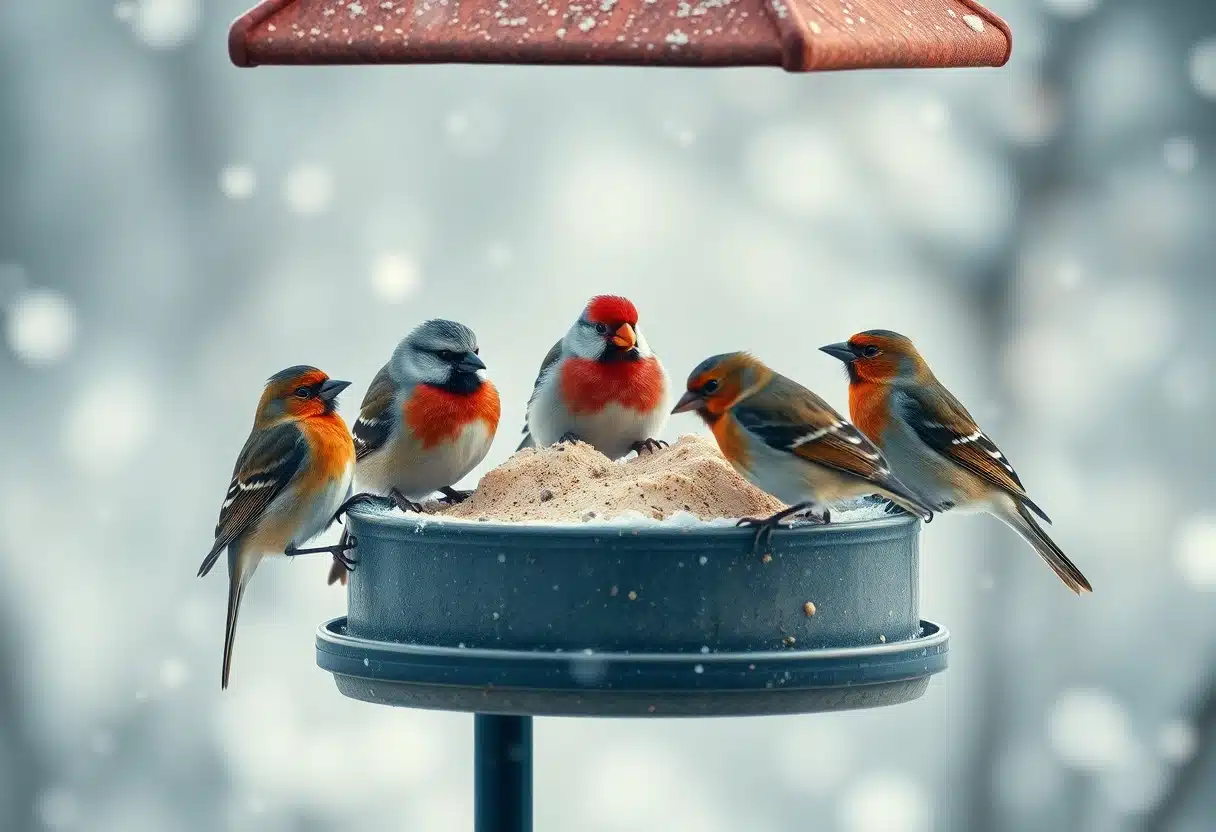Can Birds Eat Fat?
As you prepare for the cold winter months, you might be thinking of ways to help your feathered friends survive the chill. You may have heard that offering fat to birds is a great way to provide them with energy and nutrients. But beware: not all fats are created equal, and some can actually do more harm than good.
Fat from cooking, like bacon grease or roasting tins, can be fatal to birds if it’s not handled properly. In this article, we’ll explore the do’s and don’ts of feeding fat to birds, and provide you with some helpful tips on how to keep your avian friends safe and healthy.
Key Takeaways:
- Fat is not always good for birds, particularly when considering options like beef and pork fat.: While fat can provide energy and nutrients, cooking fat from roasts can be harmful to birds. It can smear onto their feathers, interfering with their waterproofing and insulation, making it difficult for them to survive the cold winter months.
- Pure fats are best: Only pure fats like lard and suet should be used to make homemade fat balls for birds. These fats provide the necessary energy and nutrients for birds to survive the cold winter.
- Avoid greasy and salty foods: Avoid feeding birds cooking fat, bacon grease, or anything too salty, as these can be harmful to their health. Instead, offer them healthy options like birdseed, nuts, and fruits.
With respect to feeding birds, it’s crucial to know what’s good for them and what’s not, especially when it comes to the types of bird seed you offer. Here’s a helpful guide to get you started:
| Suitable Foods | Foods to Avoid |
|---|---|
| Kitchen scraps like mild grated cheese | Dried coconut |
| Cooked porridge oats | |
| Cooked rice | Milk |
| Unsalted bits of hard fat | Mouldy or salted food |
| Raised potatoes | |
| Dry porridge | |
| Bird food such as mixed seed, sunflower seed, nyjer seed, and good-quality peanuts |
“Many people wrongly believe that leaving cooked turkey fat outside is beneficial for birds, but in fact, it can have disastrous effects.” – Katie

The Dangers of Feeding Birds Fat
Before you decide to feed birds fat, it’s necessary to understand the potential risks involved. As stated in Grease does birds a fat lot of good, feeding birds fat can have disastrous effects on their health. You might think you’re doing them a favor, but in reality, you could be causing more harm than good.
Damaging Feathers
Any fat or grease that comes into contact with a bird’s feathers can cause significant damage. When fat smears onto their feathers, it interferes with their waterproofing and insulation, making it difficult for them to survive the cold winter weather.
Spreading Disease
The fat from roasting tins can quickly go rancid if it’s left in a warm kitchen, forming the ideal breeding ground for salmonella and other food-poisoning bacteria. These bacteria can be fatal to birds, making it crucial to handle and store fat properly.
This can lead to the spread of diseases among birds, which can have devastating consequences.
Don’t feed birds cooking fat – it can have disastrous effects.

Suitable Foods for Birds
The variety of foods you can offer to birds is vast, but it’s necessary to know what’s safe and healthy for them. By providing the right foods, you can help support their dietary needs and ensure they thrive.
Kitchen Scraps
Among the kitchen scraps you can offer birds are mild grated cheese, bruised fruit (not moldy), cooked rice, unsalted bits of hard fat, and roast potatoes. These foods can provide necessary nutrients and energy for birds.
Healthy Fats and Grains
Suitable options for healthy fats and grains include fat balls which will give birds the energy they need. lard, Beef fat can be a suitable option if used correctly in bird feeders., and oatmeal. These can be mixed with other ingredients like seeds and nuts to create a nutritious and energy-rich food source.
You can create homemade fat balls or suet cakes with healthy fats and grains that will give birds the energy and nutrients they need to survive the cold winter months. For example, you can mix lard with and seeds to create a nutritious and tasty treat.
Here are some healthy fat and grain options you can consider:
• Lard can be used in making fat balls which will give birds a nutritious option.
• Beef fat
• Oatmeal
• Oat raisin

Foods to Avoid
For the well-being of your feathered friends, it’s imperative to know what not to feed them. Some foods can be detrimental to their health, and even fatal.
Salty and Mouldy Foods
By avoiding salty and mouldy foods, you’ll be doing your birds a huge favour. These types of foods can be disastrous for their health, causing dehydration and other issues. Don’t feed birds anything too salty, as it can interfere with their waterproofing and insulation.
Unhealthy Fats and Dairy
For a bird’s diet, unhealthy fats and dairy products are a no-go. These can cause serious health problems, including feather damage and digestive issues.
Understanding the risks associated with unhealthy fats and dairy is crucial. Fat from roasting tins can quickly go rancid if left in a warm kitchen, forming the ideal breeding ground for salmonella and other food-poisoning bacteria. These bacteria can be fatal to birds, so it’s imperative to avoid them altogether.
“Many people wrongly believe that leaving cooked turkey fat outside is beneficial for birds, but in fact, it can have disastrous effects.” – Katie Nethercoat, RSPB wildlife advisor
Instead, opt for pure fats like lard and suet, which provide energy and nutrients for birds to survive the cold winter months.
The Importance of Fresh Water
Once again, it’s vital to prioritize the welfare of our feathered friends. Fresh water is vital for their survival, especially during the harsh winter months. Without access to clean drinking water, birds can quickly become dehydrated and weak, making them more susceptible to illness and predators.
Preventing Freezing
After all, who wants to see their bird friends struggling to find a drink? Even a light breeze will help keep the water flowing, ensuring your birds stay hydrated and healthy.
Essential for Drinking and Bathing
One of the most critical aspects of providing fresh water is that it’s not just for drinking. Birds also need water for bathing, which is crucial for maintaining their feathers’ waterproofing and insulation.
Importance of fresh water cannot be overstated. Birds need water to survive the cold winter months, and it’s our responsibility to provide it. By doing so, we’re giving them the best chance to thrive and enjoy the beauty of nature.
“Fresh water is vital for their survival, especially during the harsh winter months.”
Preparing for the Big Garden Birdwatch
After learning about the importance of providing the right food for your feathered friends, it’s time to get ready for the Big Garden Birdwatch, an annual event organized by the RSPB. This event takes place from January 25-27, 2024, and is a great opportunity to contribute to the conservation of birds while learning more about the species that visit your garden and the best bird seed to use.
Stocking Up on Food
To ensure you’re well-prepared, stock up on a variety of bird-friendly foods, such as mixed seed, sunflower seed, and good-quality peanuts, and consider adding fat mixed with roasted meat to your offerings. You can also offer kitchen scraps like mild grated cheese, bruised fruit, cooked rice, and unsalted bits of hard fat. Just remember to avoid foods that can harm birds, like cooking fat, dried coconut, and milk, but consider offering cooled fat mixed with roasted meat instead.
Participating in the Event
Preparing for the Big Garden Birdwatch is easy, especially if you have a well-stocked feeder. Simply spend one hour at any time over the weekend of January 25-27, 2024, noting the number of birds in your garden or local green space. You can sign up now at rspb.org.uk/birdwatch.
Birdwatch enthusiasts, get ready to make a difference by providing feeders filled with bird-friendly foods! By participating in the Big Garden Birdwatch, you’ll be contributing to the conservation of birds and helping to protect their habitats. fatty foods can be fatal. Instead, opt for healthy options like lard and suet, which provide energy and nutrients to help birds survive the cold winter months.
Important Reminder: Always prioritize the health and safety of your feathered friends by providing fresh water and avoiding foods that can harm them.

Alternatives to Cooking Fat
Now that you know the risks of feeding birds cooking fat, it’s crucial to explore alternative options that can provide them with the energy and nutrients they need to survive.
Making Homemade Fat Balls
One excellent option is to make homemade fat balls using pure fats like lard and suet. These can be mixed with roasted meat juices, seeds, and nuts to create a nutritious and safe treat for birds.
Creating a Bird-Friendly Garden
Alternatives to cooking fat can also be found in your garden. By creating a bird-friendly garden, you can provide birds with a natural source of food and shelter.
Another way to create a bird-friendly garden is to plant a variety of bird-friendly plants, such as sunflowers, coneflowers, and shrubs that produce berries. You can also leave some areas of your garden unmanicured, providing birds with shelter and habitat. Remember to keep your garden clean and free of debris, as this can attract predators and create hazards for birds.
By creating a bird-friendly garden, you can attract a variety of bird species and provide them with the resources they need to thrive. In fact, according to the RSPB, a well-stocked garden can attract up to 104 different bird species!
“Many people wrongly believe that leaving cooked turkey fat outside is beneficial for birds, but in fact, it can have disastrous effects.” – Katie Nethercoat, RSPB wildlife advisor
So, what can you do to create a bird-friendly garden? Here are some tips:
- Plant bird-friendly plants, such as sunflowers, coneflowers, and shrubs that produce berries.
- Leave some areas of your garden unmanicured, providing birds with shelter and habitat.
- Provide a source of fresh water, such as a birdbath or pond.
By following these tips, you can create a bird-friendly garden with feeders that will attract a variety of bird species and provide them with the resources they need to thrive.
Final Words
From above, it’s clear that birds can eat fat, but not just any fat; it’s important to choose options with a suitable melt point. You’ve learned that feeding birds cooking fat from roasting tins can be fatal, as it can smear onto their feathers and interfere with their waterproofing and insulation. By being mindful of what you feed your feathered friends, you can help them thrive and enjoy the beauty of nature together.
FAQ
Q: Can I feed birds cooking fat from a joint of meat?
A: No, cooking fat from a joint of meat can be fatal to birds. It can smear onto their feathers and interfere with their waterproofing and insulation, making it hard for them to survive the cold winter months.
Q: What kind of fat is safe for birds?
A: Pure fats like lard and suet are safe for birds. They provide energy and nutrients to help birds survive the cold winter months.
Q: How can I make homemade fat balls for birds?
A: Mix birdseed, nuts, and raisins with lard, then squish it into a pinecone shape and hang it from a tree. This will give birds a tasty and nutritious treat.
As a bird enthusiast with a passion for sharing the wonders of our feathered friends. As a writer and nature lover, I'm thrilled to connect with fellow bird buffs and inspire others to take flight into the fascinating world of birds. Let's wing it together!


